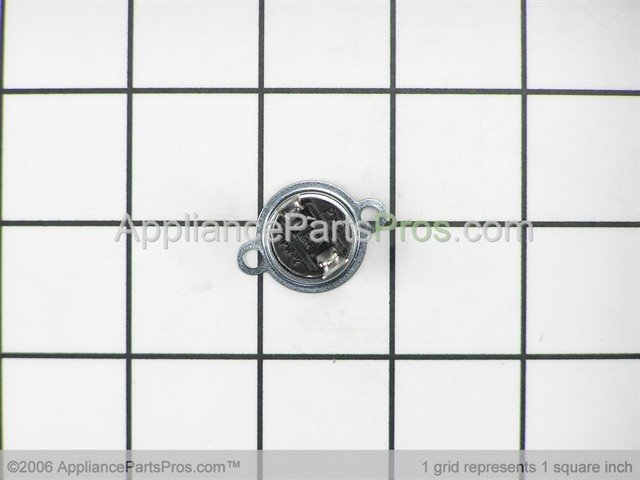|
|
That's why I referred to it as a thermal fuse. Once "blown" it is an open circuit and can not be reset. I have seen them called thermostats but that is not what they are. A thermostat controls temperature, higher or lower.
I'm glad you were able to fix your microwave.
|
|
|
Originally Posted by: ThatGuy  I'm just helping, not paid. Its up to you where you buy your parts.
You could jumper the thermal fuse, just to see if everything else works.
Just make sure you have a load inside (a cup of water at least). And don't run it very long. This did fix the problem. When I received the new "thermostat" from APP, I tested the resistance terminal to terminal, it was essentially "0" ohms. The old thermostat was open or essentially infinite resistance. I replaced the switch by unscrewing the two screws on the side of the Magnetron (using a stubby phillips screwdriver due to the confined space) and then reassembled the Microwave. It now heats food - the test being a cup of water. You can also hear the magnetron - it has a distinctive sound if you listen carefully. SO THANK YOU for your focus on this item. It turns out that if you turn on the microwave, thinking you set the timer instead with NO FOOD IN THE MICROWAVE, the magnetron will OVERHEAT, and cause the thermostat to trigger. Since it is not resettable (according to the Amana Service Manual) it has to be replaced. But the good news it did not damage anything. I was sure at the time I must have damaged either the capacitor, diode or magnetron - but that was not the case.
|
|
|
Good Idea, however I should receive the replacement part either tomorrow or the day after and will replace the part - then try the microwave with a load (at least a cup of water) and then let you know the results. Yes, the thermal fuse is mounted on the side of the magnetron with (2) screws. I had mentioned the origin of the repair parts, because although I trust APP (the parts are factory packaged, the magnetron was in what appeared to be a factory box, but not sealed and was purchased on Amazon. It looked new, and it tests out okay (as well as the old one, since I've tested both). So this thermal fuse is a possible causal factor. Your assistance is very much appreciated.
|
|
|
I'm just helping, not paid. Its up to you where you buy your parts.
You could jumper the thermal fuse, just to see if everything else works.
Just make sure you have a load inside (a cup of water at least). And don't run it very long.
|
|
|
I did check the resistance using a Fluke Digital Ohm Meter, and it showed that the "thermal fuse" was open. The repair manual says that this is not resettable, and that it would have to be replaced, but they don't specifically say how to test it. So I ordered Appliance Parts Pros Part Number AP6009656 after reviewing the exploded view diagram for the magnetron. Please be mindful that I have replaced the magnetron (purchased elsewhere since APP does not stock this item any longer) and purchased from APP a replacement capacitor, coil and diode. What else can I replace or check?
|
|
|
You are most likely correct. Will check, as it is part of the safety system, and could be the issue if not functioning correctly.
BTW, I did test the magnetron today, and it is 0.4 ohms from post to post, and from post to chassis open or infinite resistance (insofar as can be measured).
So according to the repair manual, that means that the magnetron was not the issue.
Will keep you posted on the results.
-Douglas
|
|
|
I quoted you calling the part a thermister. I don't think that part is a thermister, I'd bet its a thermal fuse put there to protect the magnetron from very high temperatures.
It should test as a short (with continuity) so it can complete the circuit. If it got too hot, it would open and have no continuity. Breaking the circuit.
|
|
|
I did not test the thermistor, but will do so now. What is the typical resistance expected? (I suppose that would be at room temperature). And yes, that is what it looked like. I did subsequently determine (google) that thermistors have no polarity.
|
|
|
Did you test the "thermistor" for continuity? Was it mounted on the side of the magnetron and did it look like this? 
|
|
|
The microwave stopped working after having turned it on without any food inside (I had intended to just set the timer).
Because the microwave is so difficult to remove from the overhead cabinet above the stove, I decided to replace the magnetron, capacitor, diode and coil (which I did). The capacitor, diode and coil were sourced from appliancepros. The magnetron was a new Maytag replacement equivalent sourced on amazon.com. I did have to transfer the thermistor from the old magnetron to the new one. After cleaning the unit and replacing the parts above, it still does not heat food. Can you suggest anything further?
|